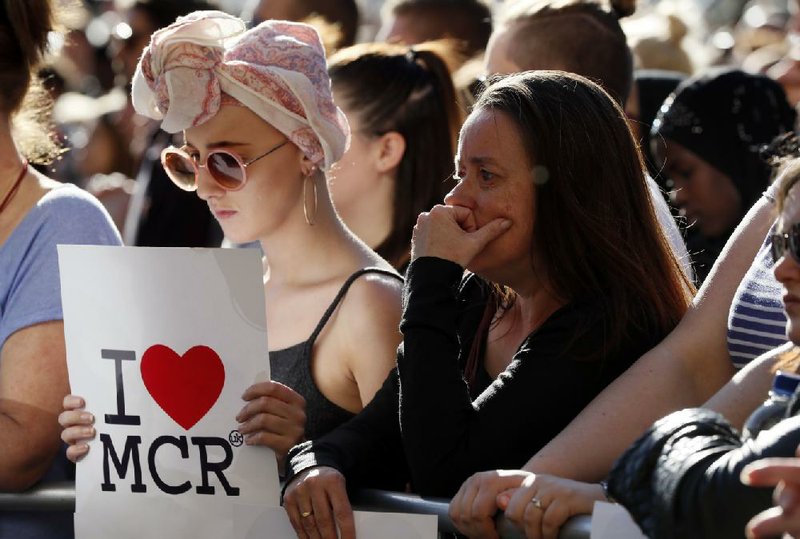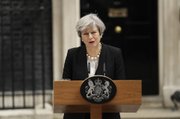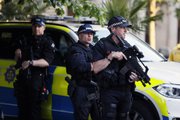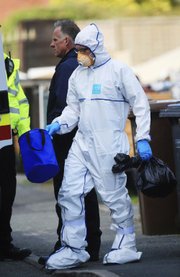MANCHESTER, England -- As the British prime minister warned another attack could be "imminent," officials hunted for accomplices of the suicide bomber who struck a pop concert Monday night.
In defiance of terror, thousands of people poured into the streets of Manchester in a vigil Tuesday for victims of the blast at a show by singer Ariana Grande.
The attack left at least 22 dead, including an 8-year-old girl.
In a speech outside No. 10 Downing St., where flags were lowered to half-staff, British Prime Minister Theresa May called the Manchester killings a "callous terrorist attack."
"We struggle to comprehend the warped and twisted mind that sees a room packed with young children not as a scene to cherish but as an opportunity for carnage," she said.
May said the United Kingdom's terror threat level had been raised to critical -- meaning another attack may be imminent. The status means armed soldiers could be deployed instead of police at public events including sports matches. The threat level had been at the second-highest rung of "severe" for several years.
"Over the coming days as you go to a music venue, go shopping, travel to work or head off to the fantastic sporting events you will see more officers, including armed officers," said Commander Jane Connors of London's Metropolitan Police Department.
May called raising the country's terror threat level and deploying soldiers to patrol key sites a "proportionate and sensible response" to the suicide bombing. There are two major sports events in London on Saturday, with Wembley Stadium hosting soccer's FA Cup final, which Prince William is expected to attend, and Twickenham hosting rugby's Premiership final.
[INTERACTIVE: Timeline, map of attack]
The Islamic State extremist group claimed responsibility for the attack Monday, though a top U.S. intelligence official said the assertion could not be verified. Its statement was posted on the online messaging service Telegram and later noted by the SITE Intelligence Group, which monitors militant websites.
The Islamic State often quickly proclaims links to attacks, but some previous boasts have not been proven.
In Washington, Director of National Intelligence Daniel Coats said Tuesday that despite the group's statement, "we have not verified yet the connection." He noted in a Senate hearing that "they claim responsibility for virtually every attack."
Greater Manchester Chief Constable Ian Hopkins identified the bomber as 22-year-old Salman Abedi, who authorities said died in the attack. Police raided two sites in the northern English city, setting off a controlled explosion in one, and arresting a 23-year-old man in a third location.
The highest priority for police, Hopkins said, was to "establish whether [Abedi] was acting alone or as part of a network."
May said Abedi was born and raised in the U.K. and a European security official said he was of Libyan descent. The official spoke on condition of anonymity because he was not authorized to comment on ongoing investigations.
At least 20 heavily armed, helmeted police surrounded a modest red brick house listed as Abedi's address in a mixed Manchester suburb at midday on Tuesday and blasted down the door.
"It was so quick. These cars just pulled up and all these police with guns, dogs, jumped out of the car and said to us, 'Get in the house now,'" said Simon Turner, 46, who lives nearby. Later, forensic officers in white coveralls were seen going in and out of the property.
Details on Abedi were slow to trickle out. He was described by neighbors as a tall, thin young man who often wore traditional Islamic dress, but few said they knew him well.
Alan Kinsey, 52, who lives across the street, said his neighbor would often get picked up by another young man in a Toyota and often returned late at night. "I thought he worked in a takeaway [restaurant] or something" because of his late hours, Kinsey said.
Police also searched an apartment in a nearby area that British media reported belonged to Abedi's brother, Ismail.
Children mourned
The security operation came as the nation grieved for the young victims, with thousands of people converging on Manchester's graceful Albert Square for a vigil that was part solemn remembrance and part rally against extremism.
Some held up signs proclaiming "I Love MCR" -- an abbreviation for Manchester -- and held a moment of silence at a vigil for the victims. Lord Mayor Eddy Newman and the city's police chief were among the speakers in front of City Hall in Albert Square, where a banner with a website for a Muslim group said "Love for all, Hatred for None."
Among those confirmed killed was Georgina Callander, 18, whose death was reported by her former school, which posted a photo of her in her school uniform on its website and described her as a "lovely" and "very popular" young woman. Also killed was 8-year-old Saffie Roussos, whom a teacher called "simply a beautiful little girl in every aspect of the word" who was warm, kind, "and unassuming, with a creative flair."
The little girl's mother and sister were among the 59 wounded, which included at least 12 children under the age of 16.
Grande, who was not injured in the blast, tweeted: "broken. from the bottom of my heart, i am so so sorry. i don't have words."
The bombing took place after Grande closed the show with "Dangerous Woman" and left the stage and the audience streamed toward the city's main train station. The bomb scattered bolts and other metal scraps, apparently intended to maximize the bloodshed. People tumbled over guardrails and one another clawing toward an escape.
"There was this massive bang. And then everyone just went really quiet. And that's when the screaming started," said 25-year-old Ryan Molloy. "As we came outside to Victoria Station, there were just people all over the floor covered in blood."
The attack sparked a night-long search for loved-ones -- parents for the children they had accompanied or had been waiting to pick up, and friends for each other after groups were scattered by the blast. Twitter and Facebook lit up with heartbreaking appeals for the missing.
Hayley Lunt, who brought her 10-year-old daughter Abigail to the show, her very first concert, said they ran as fast as they could once the explosions rang out. "What should have been a superb evening," Lunt said, "is now just horrible."
Some concertgoers said security had been haphazard before the show, with some people being searched and others not. However, authorities would not say whether the bomber blew himself up inside or outside the arena, so it wasn't clear whether rigorous bag screening or additional security would have helped prevent the deaths and injuries. The venue tweeted on Monday night that it happened "outside the venue in a public space."
Queen and Trump
Around the United Kingdom and across Europe, the attack brought fear and mourning.
At Buckingham Palace, Queen Elizabeth II marked a moment of silence alongside her husband Prince Philip as well as Prince Charles and his wife, Camilla.
"The whole nation has been shocked by the death and injury in Manchester last night of so many people, adults and children, who had just been enjoying a concert," she said.
In Rome, the lights of the Colosseum and Trevi Fountain were darkened.
President Donald Trump, on a visit to the West Bank city of Bethlehem, called the perpetrators "evil losers" and said "this wicked ideology must be obliterated."
Manchester, 160 miles northwest of London, is one of Britain's largest cities. The attack was the deadliest in the U.K. since four suicide bombers killed 52 London commuters on subway trains and a bus in 2005.
Islamic State's claim of responsibility echoed others the group has made for attacks in the West but with vague details that left open the possibility it was an opportunistic attempt at propaganda. Manchester itself has seen terror before, but not this deadly. The city was hit by a huge Irish Republican Army bomb in 1996 that leveled a swath of the city center. More than 200 people were injured, although no one was killed.
The bombing also elicited painful memories of the 2015 terror attacks in Paris, where most of the 130 killed were at the Bataclan concert hall.
Information for this article was contributed by Jill Lawless, Rob Harris, Sylvia Hui, Gregory Katz, Brian Rohan, Paisley Dodds, Lisa Leff, Sophie Berman, John Leicester, Lori Hinnant, Eric Tucker and Matt Sedensky of The Associated Press and by Griff Witte, Karla Adam, Souad Mekhennet and staff members of The Washington Post.
A Section on 05/24/2017



